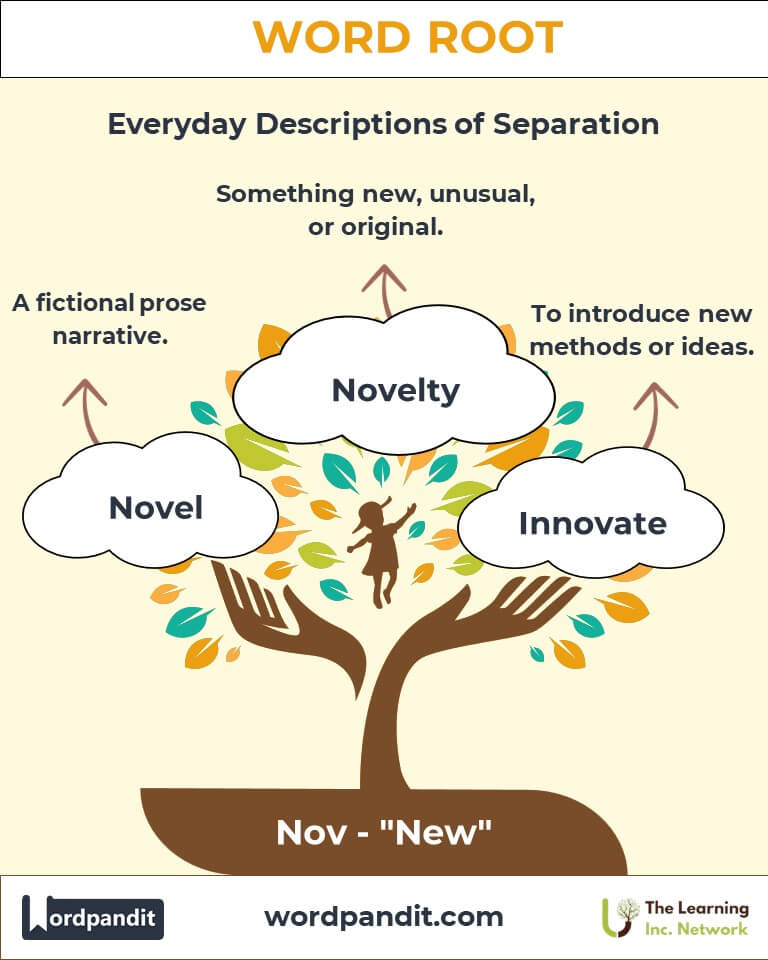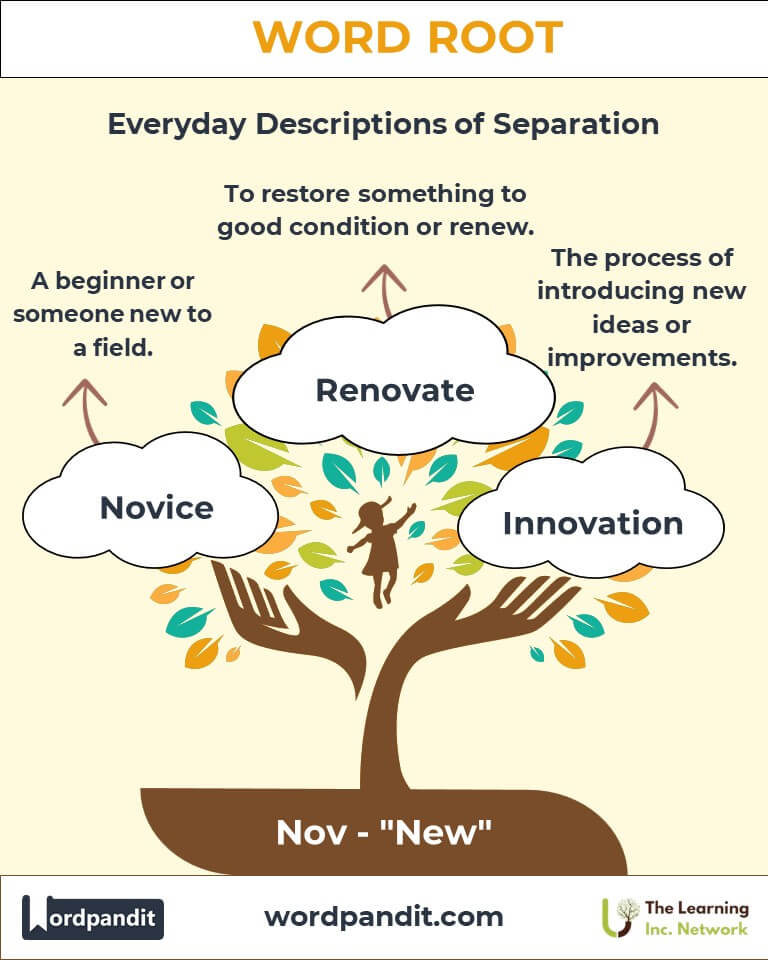Nov: The Root of New Beginnings in Language and Innovation
Discover the transformative power of the root "nov," derived from the Latin word novus, meaning "new." From intriguing tales of novelty to groundbreaking innovations, "nov" has established itself as a linguistic cornerstone, symbolizing fresh ideas and progress.

Table of Contents
- Introduction: The Essence of "Nov"
- Etymology and Historical Journey
- Mnemonic: Unlocking the Power of "Nov"
- Common "Nov"-Related Terms
- "Nov" Through Time
- "Nov" in Specialized Fields
- Illustrative Story: "Nov" in Action
- Cultural Significance of the "Nov" Root
- The "Nov" Family Tree
- FAQs about the "Nov" Word Root
- Test Your Knowledge: "Nov" Mastery Quiz
- Conclusion: The Living Legacy of "Nov"
Introduction: The Essence of "Nov"
Imagine the excitement of discovering something new—the joy of a novel idea or the allure of a fresh story. This sentiment lies at the heart of the root "nov" (pronounced nahv), originating from Latin. It signifies "newness" and permeates words and concepts that celebrate creativity, progress, and originality. Whether in literature, technology, or daily life, "nov" continues to shape the narrative of growth and renewal.

Etymology and Historical Journey
The root "nov" derives from the Latin novus, meaning "new." In ancient Rome, this root reflected cultural and technological advancements, embedding itself in words like novitas (novelty) and innovare (to renew or innovate). Over time, novus influenced Romance languages and English, giving rise to terms that encapsulate discovery and transformation.
During the Renaissance, "nov" gained prominence as societies embraced innovation in art, science, and philosophy. Its adaptability ensured its survival and relevance, resonating with the human quest for progress.
Mnemonic: Unlocking the Power of "Nov"
To remember "nov," picture a glowing lightbulb, symbolizing a new idea.
Mnemonic Device:
"Nov sparks the 'new'—like a novel story or innovation breakthrough."
Common "Nov"-Related Terms
- Novel
Pronunciation: nah-vuhl
Definition: A fictional prose narrative.
Example: "Her latest novel captivated readers with its unique storyline." - Innovate
Pronunciation: in-uh-vayt
Definition: To introduce new methods or ideas.
Example: "The startup aims to innovate how we access renewable energy." - Novice
Pronunciation: nah-viss
Definition: A beginner or someone new to a field.
Example: "Although a novice, she quickly mastered the basics of coding." - Renovate
Pronunciation: reh-nuh-vayt
Definition: To restore something to good condition or renew.
Example: "The team plans to renovate the century-old library." - Novelty
Pronunciation: nah-vuhl-tee
Definition: Something new, unusual, or original.
Example: "The novelty of virtual reality attracted tech enthusiasts."
"Nov" Through Time
- Novel: Originating from the Latin novellus (a diminutive of novus), novels initially described short stories during the Renaissance. Over time, they evolved into comprehensive works of fiction.
- Innovate: Rooted in innovare, innovation gained momentum during the Industrial Revolution, symbolizing technological and societal advancement.
"Nov" in Specialized Fields
- Technology: Innovation drives industries forward, introducing groundbreaking solutions like smartphones and AI.
- Medicine: Novel therapies bring hope to patients by offering new treatments for chronic diseases.
- Architecture: Renovation breathes new life into historic buildings, merging the old with the modern.
Illustrative Story: "Nov" in Action
Ella, a young engineer, had a novel idea to reduce energy consumption in homes. Although a novice in the field, her innovative design for a self-adjusting thermostat won accolades. Inspired, she began renovating older systems, proving that fresh perspectives can solve longstanding problems. Her journey exemplifies the power of "nov" in driving change.
Cultural Significance of the "Nov" Root
The concept of "newness" is celebrated across cultures. From the Chinese New Year, symbolizing fresh starts, to the Renaissance's focus on innovation, "nov" embodies humanity's universal desire for growth. In literature, "novelty" has captivated audiences with fresh narratives and perspectives.

The "Nov" Family Tree
- Neo- (Greek: "new"):
- Neoclassic: Reviving classical styles.
- Neonatal: Relating to newborns.
- Ren- (Latin: "again"):
- Renaissance: A period of cultural renewal.
- Renew: To make new again.
- Creat- (Latin: "to make"):
- Create: To bring something new into existence.
- Recreation: Activities that refresh or renew energy.

FAQs About the "Nov" Word Root
Q: What does the root "nov" mean?
A: The root "nov" comes from the Latin word novus, which means "new." It signifies novelty, originality, and progress, underpinning words that describe fresh beginnings, discoveries, and innovations.
Q: How does "novice" differ from "beginner"?
A: While both refer to someone new to a field, "novice" often implies a formal or structured context, such as someone in training or part of a religious order, whereas "beginner" is more general.
Q: What is the role of "novel" in literature?
A: In literature, a "novel" is a long fictional prose narrative with developed characters and themes. The term comes from the Latin novellus, emphasizing originality and creativity in storytelling.
Q: How is "innovate" different from "invent"?
A: To "innovate" means to improve or introduce new methods, ideas, or products, often building upon existing concepts. "Invent," on the other hand, refers to creating something entirely new.
Q: Why is "nov" associated with progress and creativity?
A: The root "nov" embodies moving beyond the old to embrace the new, reflecting humanity’s drive for discovery and improvement. It underpins progress in science, technology, and art.
Test Your Knowledge: "Nov" Word Root Quiz
1. What does the root "nov" signify?
2. Which term describes a beginner?
3. What does "renovate" mean?
4. Which word refers to a fictional narrative?
5. What is innovation associated with?
Conclusion: The Living Legacy of "Nov"
The root "nov" continues to inspire and shape our world, reflecting the human spirit's drive for novelty, innovation, and renewal. Whether crafting a novel, renovating a space, or pursuing groundbreaking ideas, "nov" reminds us of the endless possibilities that come with embracing the new. Let it encourage you to explore uncharted territories and celebrate fresh beginnings!














